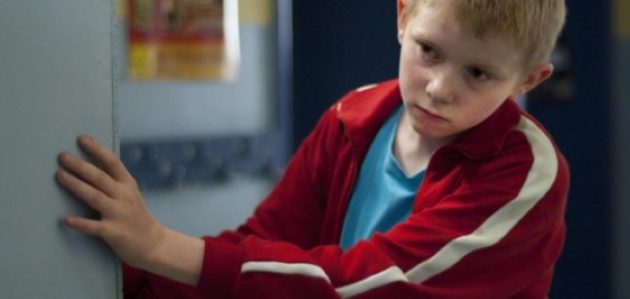REVIEW: The Dardennes' The Kid with a Bike May Not Move So Fast, But Its Young Star Sure Does

In strict dramatic terms, almost nothing occurs in the Dardenne brothers’ The Kid with a Bike. Some characters show a lack of empathy, even cruelty, but there’s more than enough kindness elsewhere to make up for it, and the terrible things you fear might happen simply don’t. Those qualities make the movie seem slight, almost inconsequential, as if the merest breeze would blow it off-course. But the real strength of The Kid with a Bike is the cautious but generous warmth of its storytelling. Not much happens in The Kid with a Bike, but it leaves you grateful that the worst doesn’t happen — with these characters, you might not be able to bear it.
The Kid with a Bike starts out as your standard child-at-risk story. Cyril (played by the fine young actor Thomas Doret, in his debut) is an 11-ish redhead with a buzz cut who's in perpetual movement from the movie's first minute: Peripatetic, quizzical and persistent, Cyril is obsessed with reconnecting with his father (played by Dardennes regular Jérémie Renier), who has essentially abandoned him to a local home for displaced or problem kids. Cyril also wants his bike back — he believes it's still in the apartment his father has recently also abandoned — and with the help of a quietly compassionate hairdresser he meets by chance, Samantha (Cécile De France, in a relaxed but extremely focused performance), he does get it back. Recognizing, in some basic, primal way, that he's found someone who might be able to give him the care and affection he needs, Cyril latches onto her, figuratively and even at one point literally — he clamps his arms around her in an ironclad, monkeylike embrace. He also makes a bold request, asking her outright if she’ll let him live with her on the weekends, even though she barely knows him. With no hesitation she agrees. But even under Samantha's guidance and care, Cyril is still something of a lost kid, which causes him to fall under the spell of a local hood, who hopes to enlist him in a life of petty crime.
On the basis of previous pictures like The Son or L’Enfant, you might think Jean-Pierre and Luc Dardenne would lean heavily on the suspense card: The Belgian writing-directing duo aren’t exactly the cheeriest guys on the planet, and if they were to follow their more dour instincts, they might have fixated on the question of whether or not Cyril would succumb to thuggery. But they’re after something more delicate here, and if it doesn’t completely work — the movie is so muted it comes off as being a bit wayward in its emotional and narrative focus — there’s still something admirable in their outright rejection of desolation and despair. (The picture won the Grand Jury Prize at Cannes last May.) The ending of The Kid with a Bike holds out a very real possibility for redemption. It doesn’t hurt that the picture, set in an unnamed provincial town and filmed in some gorgeously bucolic parts of Belgium, is also beautifully shot (by DP Alain Marcoen): The images have a clean, crisp, no-nonsense look that's almost a metaphorical counterpart to Cyril's confident physicality as he whizzes from here to there.
Doret, for all his preternatural confidence in this role, is still an unassuming and sympathetic presence. With that strawberry-blond perpetual-summer haircut, and a reckless scattering of freckles across his nose, he looks like the kind of kid you’d see on a '50s bread wrapper. But his face is solemn and purposeful, and his mannerisms are too: When he makes or takes a call on his cell phone, he conveys information with just-the-facts-ma’am efficiency. His body is gangly and puppet-like in that pre-adolescent way, but every movement is resolute: When he chases after the various kids who, repeatedly, try to steal his precious bike, he throws off sparks of grim determination, like a single-minded marathon runner. Maybe, in the end, he outruns the movie. But it's hard to take your eyes off him as he sprints into the distance.
[Editor's note: This review appeared earlier, in a slightly different form, in Stephanie Zacharek's 2011 Cannes Film Festival coverage.]
Follow Stephanie Zacharek on Twitter.
Follow Movieline on Twitter.
